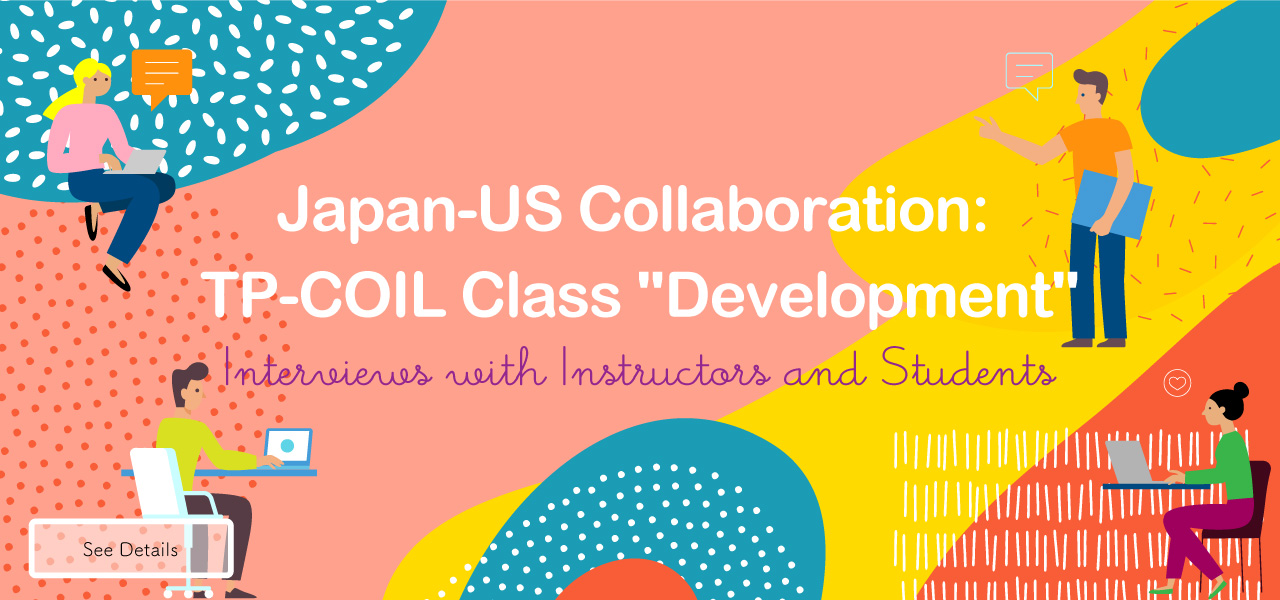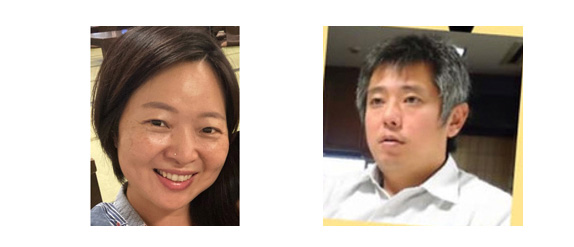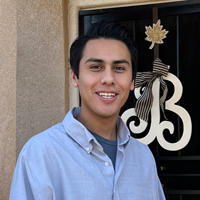Japan-US Collaboration: TP-COIL Class “Development” – Interviews with Instructors and Students
TUFS Featured

With the support by Ministry of Education, Culture, Sports, Science and Technology, the TP-COIL project (Trans-Pacific Collaborative Online International Learning for the Multiculturalism and Conflict-resilience) started in 2018. TUFS and ICU are the leading institutions for TP-COIL and have provided a wide range of opportunities including COIL-type classes in cooperation with universities in the United States.
As the part of the activities, the class on the theme “Development” was held from February 6, 2022 to February 8 (Title: [COIL] ‘Development’: is it saving the world or making a change in your community? – Is Japan the final destination of ‘development’? ). During the course, we connected universities in both Japan and the United States online and had opportunities for frequent discussions and collaboration.
This time, in addition to Ms. Kim Garu Yoonjung and Mr. Hirano Masahito who managed the class and Assistant Professor Fukuda Aya who is the coordinator of this project, two students who participated in the class tell us the details of their experiences and their impressions!
This class will be held in the summer semester this year. Please check the syllabus and take this class if you are interested in!
[Syllabus for this summer]
- [1] For students who entered in 2018 or earlier
- [2] For students who entered in 2019 or later
([1] and [2] differ only in the time schedule code, and the content and time of activities are conducted simultaneously
About the Class
First of all, we asked questions to instructors in charge, Ms. Kim and Mr. Hirano, about the contents of the class and the points that they focused on.

KIM Garu Yoonjung (As “KIM”)
Strategic Planning Analyst & East Asia Diamond Integrator, Ashoka, Innovators for the Public, Washington DC, USA & Tokyo, Japan
Ms. Kim has vast experiences working in the development field in Japan, USA, Nigeria, Uganda, Nepal, Cambodia, Germany, UK, and Korea with UN organizations, the governmental organization, international NGOs and local NGO/NPOs.
HIRANO Masahito (As “HIRANO”)
Representative Director, GINZA Conference on Environment, Chiba, Japan
In addition to the working experience at the private company, Mr. Hirano has abundant experiences in the development field in Cambodia and Laos with NGOs for more than 15 years.
—The theme of this class is “Development.” What was your approach in planning the class?
KIM Considering that it was one of a few classes offered in TUFS with regards to ‘development’, we wanted it to provide good amount of introductory information on development covering various thematic areas such as education, health and sanitation, gender, environment, and community participation. In order to avoid scratching the surface, we decided to invite specialists from the specific areas to talk about their work. Based in different countries from Malawi, USA, Korea to Japan, the specialists prepared video presentations which worked very well with the COIL format.
HIRANO The word “Development” can be translated into Kaihatsu, Hattatsu or Hatten in Japanese and each of those three words should have multiple corresponding English words, which implies that defining what development is itself should be something complex and difficult. On the other hand, those who are interested in “Development” can easily imagine what a development project is like, which implies that a so-called development worker may be engaged in development work without a concrete belief about what development is and that even he/she has one, it can be different that of others. So, my emphasis was put strongly on providing students with resources which lead them to consider rather vague question which is “what development is”.
—How was the contents and structure of the class? What did you focus on when conducting the class?
KIM The topics we covered were almost as extensive as UN’s SDGs (Sustainable Development Goals). While focusing on global issues, we also hoped that students to come to see connectedness between Japanese local issues with those global issues in this closely knitted world. That’s why we included topics related to Japan such as gender issues in Japan and international relations for Japan, which also served the interest of the American students who had curiosity towards Japanese culture and society.
In terms of the format, even though COIL had its own advantages for inviting students from Japan and USA, we wanted to make sure these students interact with each other as much as possible. We instructed students to express their thoughts toward fellow students’ opinions through the Slack dashboard and arranged zoom breakout room discussions during the realtime sessions.
HIRANO In preparing the lectures, I thought much of making clear connections between historical events and how things are like at present. Because of the nature of the lecture I was mainly responsible for, the contents were somehow like those of history classes. By making clear that important events in the past are all related to our present situation, I believe that students could have deep understanding about why the world is as it is and what has to be changed.
Another thing I put emphasis on was to, if I intentionally use a bit strong word, agitate students so that they hopefully make actions. I also illustrated what they could do to “develop” our world.
—What were your impressions of the class held? Was there anything that was better than you had expected beforehand?
KIM I was impressed with the students’ attitude toward the class and topics. They were committed in completing the homework as well as participating in discussion with the fellow students. More than anything, they were deeply curious about the world and development and genuinely saddened about how poverty and inequality prevent people from enjoying universal human rights to basic needs. After 15 years working as a development worker, some part of me became numb to the reality but TUFS students rekindled my passion towards this issue. In that sense, I have to admit it was me who learned something big from this class.
HIRANO It was also impressive for me that the students worked hard and showed their passion on making this world better and helping others. First, I was a bit concerned that those who were good at English, including native speakers, might dominate the class. I cannot say it did not happen at all, which is too natural to avoid and was nobody’s fault. But at the same time, those who were less fluent in comparison with those who were very good also tried their best and the class had atmosphere to encourage them to do so.
—Is there anything good in conducting the class because of the COIL format? *COIL: Collaborative Online International Learning
KIM COIL allowed several American students to join the class who played critical role in throwing a new perspective to Japanese students. Although we are all different as an individual, certain things are widely shared because students in Japan come from Japanese upbringing. In that context, I believe that the views of American students from different perspectives have greatly contributed to broaden the scope of the discussion.
HIRANO Yeah, as Garu says, while we were very careful not to push any stereotype images of any countries, we discussed about differences between Japanese and American youths, such as what was behind the fact that most Japanese youngsters were not positive with jumping on the street to protest climate injustice, even among those who were concerned with the issue. As one can imagine, those participating American students were more or less interested in Japan and Japanese culture. So, such discussions must have been interesting for them and at the same time it must have been meaningful for the Japanese students to shed light on their own “Japanness”.
Comments From Students Who Participated In The Class
Julio Baeza
University of California Riverside
—What was your motivation to attend this class?

I am currently studying Japanese Language and Literature and hope to teach English abroad after graduation.I was motivated to attend this class after hearing about it from one of my Professors. What caught my attention was being able to interact with Japanese students and be able to learn about their different viewpoints on certain global events and topics, while also getting a better understanding of the world and foreign events. In addition to that, I wanted to learn more about what development means and what it means to others. To me, development means a way to improve upon. Not just in the structural sense, but in life as well. A person can help to develop their life and strive to make it better. Not for the sake of others, but for their own.
—What was your overall impression/experiences of the class? e.g. including interesting points, challenges, the interaction with your classmates, the learning outcome that changed your thought/mind etc.
I found this class to be really interesting. Not only was I able to get a better understanding of what development means, but how others view it as well. When I first started this class I had a vague idea of what development was and never thought much about it. But after taking this class, I found out that there is a lot more to development than what meets the eye. I had a wonderful time interacting with the Japanese students of TUFS. All of them had a lot to say on the topics that we discussed, as well as helped me to get a better insight with regards to certain issues that are currently going on in Japan. Not only that but I was able to get a better understanding of how Japanese society works. The one challenge that I faced was that it felt as though I knew too little about what development is compared to my classmates. In order to overcome this, I had to do outside research in order to get a better grasp on the development and find more information with regards to how development is used to help improve the lives of people in developing countries. While I do think we should help these countries to develop, we shouldn’t have too much control over their development. We should let them choose how they want to develop themselves and assist them in achieving that.
—How would you like to apply what you have learned through the class to your future life (and, if applicable, career path)?
As development is not only limited to an architectural standpoint, I believe development is also used when it comes to someone wanting to better themselves. After graduation, I plan to teach English abroad. As a teacher, you have to strive to help your students improve. Not just with education, but with their life. I plan on taking what I learned from this class and using it to help my students to better develop their life goals. I want to help them to strive for success and to help them figure out who they are. I want them to better themselves and to be prepared for the kind of world that is waiting for them when they enter adulthood.
Kyoka Oimatsu
School of International and Area Studies, TUFS
—What was your motivation to attend this class?

I decided to participate in this class because I want to have a broader knowledge and perspective on development. After graduation, I would like to go to a graduate school in England to study development and immigration. Therefore, I wanted to acquire knowledge about development while I was an undergraduate student.
Through the course, I expected to learn not only basic knowledge and theory of development studies, but also practical viewpoints (For example, what it means to run a development project.). Also, since the word “development” is understood differently depending on the person’s background, I thought that the COIL class, in which people can share their opinions and experiences with American students, would be a very meaningful opportunity.
—What was your overall impression/experiences of the class? e.g. including interesting points, challenges, the interaction with your classmates, the learning outcome that changed your thought/mind etc.
We were able to rethink development from various angles. Before I took the class, I thought of development as a tool to help vulnerable people get what they want, but this class led me to believe that there are not necessarily only positive aspects of development. Development for me now is about flexible tools. This is because while development allows each individual to reach his or her full potential, it can also disadvantage local people.
There are other classes that we can learn the basic theory of development studies, but I think it is only in this class that we can hear about the experiences in the field from such a wide variety of people with practical experience. It was attractive that these practitioners were active in a wide range of fields, including water and sanitation, gender, environmental conservation, and social business.
I was also impressed by the opportunities to actively interact with other students while holding discussions and watching movies online. In particular, the exchange of opinions with American students revealed the differences between Japan and the United States in terms of the work of civil society and gender views, and provided an opportunity to reexamine Japan from the perspective of development. I think I wanted to take a class like this when I was a freshman.
—How would you like to apply what you have learned through the class to your future life (and, if applicable, career path)?
I would like to work in the field of development and humanitarian assistance in the future. I will continue to ask myself about the two aspects of development that I learned through lectures from practitioners and discussions with participating students.
About The Program
This year will be the final year of the project in 2022. We asked Assistant Professor Dr. Aya Fukuda, the coordinator of this project, about the project.
—Please tell us if you have any new findings from the COIL type education activities.

I think it was meaningful that we were able to utilize COIL and provide an opportunity for students from Japan and the US to study together on the theme of development by inviting two specialists with abundant practical experiences in the field. Considering development assistance, both the US and Japan are in a similar position as ‘providers’ in this field, while two countries also face diverse social challenges within their respective countries. In the asynchronous part of this class, there was the opportunity that experts overseas in various fields delivered lecture videos and students learned from it. Based on this, the class provided the opportunity for students from Japan and the US to exchange their opinions on development – which can be very universal and philosophical themes such as what development means and what the situation is in which we feel happiness. This made me feel again the beauty of the COIL format.
—The COIL business enters its 4 year period and the next fiscal year will be the final year. Classes and activities are becoming more and more fulfilling. What are you planning for next year?
It seems that online learning and teaching are becoming more established and popular due to the pandemic. In these days, study abroad programs with actual travel are gradually resuming. However, it will take some more time for study abroad programs become possible as it was before the pandemic. We cannot exactly make up for the loss of opportunities of study abroad for students, but we hope to continue to steadily provide the COIL-type education this year too that we have developed thus far. Even after the pandemic is over, I deeply hope that this method will take root so that students who are unable to physically study abroad due to financial or health reasons will be able to study together with students from other countries while staying at their home universities.

